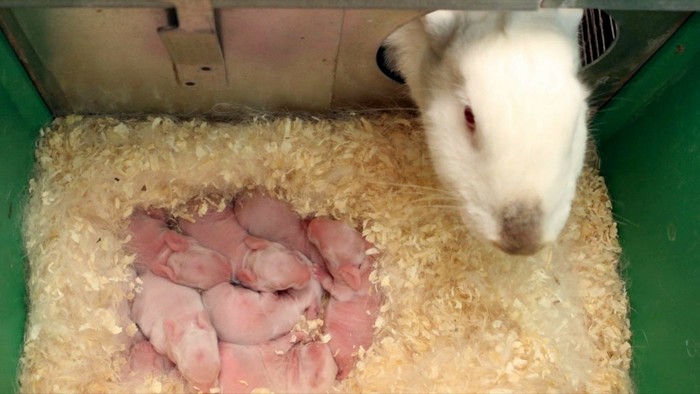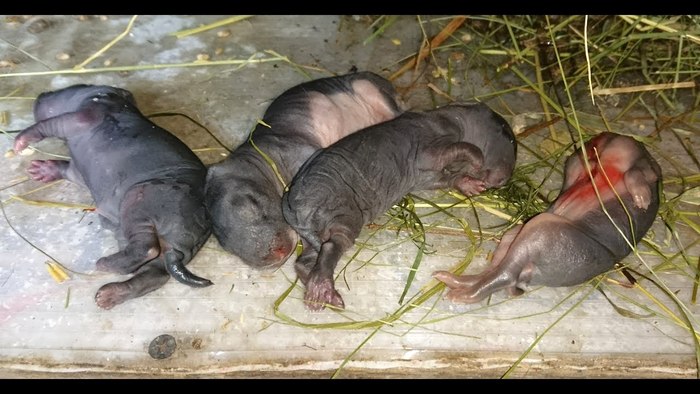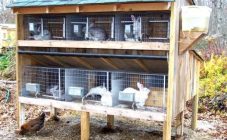Content:
Breeding rabbits in terms of their high fertility, rapid growth and high cost of rabbit meat is considered very profitable. They are often very peaceful and friendly animals. However, there are times when the cruelty of the eared is simply amazing. If the rabbit ate the little rabbits, this is puzzling for many novice farmers, although the manifestation of cannibalism in eared ones is quite a frequent occurrence. The reasons and methods of dealing with the problem are below.
Why does a rabbit eat her babies and how to deal with it
Probably, everyone who faced the problem thought about the reasons for its occurrence. Why do rabbits eat their babies? Most likely, the first thing that farmers pay their attention to is the diet of their wards, and this is absolutely correct, but there are other nuances. If the rabbit ate the rabbits, the reasons may lie in the following:
- Improper diet and poor care Is the main explanation for why rabbits eat their babies. After giving birth, the mother is very thirsty and also needs a lot of minerals and protein. If the owners forget to supply water or replace it with fresh water, the female can quickly deal with her children.
- Lack of milk from the nursing or insufficient amount of it. The female can immediately reduce the number of children in order to survive the remaining.
- The last and also a very common reason why a rabbit eats rabbits is getting rid of dead cubs. Eared rodents, being very shy animals, give birth in the quietest time of the day (at night or early in the morning). In this regard, the farmer may simply not know about the birth of dead individuals, but fix the fact of eating cubs
Methods to combat cannibalism in rabbits
In addition to the pronounced cannibalism, rabbits can eat different parts of the body of their relatives, for example, they quite often like to gnaw each other's ears. To prevent rabbit cannibalism, you must strictly observe the regime and diet of feeding. If this does not help, then fumaric acid is added to the food - 100 kg per 1 ton of feed mixture.
Why did the bunny scatter newborn bunnies
In addition to eating babies, rabbits very often scatter their newborn cubs. This is often accompanied by a lack of appetite in the adult. The main reasons why the rabbit could scatter newborn rabbits:
- poor conditions for life in the cage;
- the female determines that the babies are sick and will not survive;
- the mother is young and inexperienced;
- mastitis has begun;
- the female continues to hunt;
- not enough milk;
- psychological problems;
- the rabbit believes that the owners are behaving incorrectly towards her;
- cubs drop out of the nest after the end of feeding.
If we consider these reasons, then first of all you need to pay attention to the microclimate in the cell. According to the animal, it can be very dirty, hot or cold, humid, dangerous.
Low temperature in the cages contributes to the development of mastitis in the rabbit. In this regard, it is painful for her to feed her rabbits, and she may refuse to feed at all.The same situation occurs when the mother has little milk and the rabbits suck her for a long time. As a result, the nipples begin to hurt, and, as a result, the mother can throw the babies out of the nest.
In addition, low fever can affect newborns. They become passive, move little, in turn, the mother considers them incapacitated and begins to weed out from the general circle. However, sometimes the rabbit deliberately weeds out obviously weak babies, and continues to carefully look after the rest.
A few days after the birth, the rabbit may begin to hunt. At the same time, all maternal instincts are lost, and, as a result, the rabbits are without care and are simply scattered around the cage. Signs of sexual desire are marks, being in an agitated restless state, moving the hindquarters back when touched, etc.
The above signs of rabbits spreading can be eliminated or cured. But if the problem is in the psyche of the rabbit and she begins to behave inappropriately for no reason, then there is only one way out - to kill the animal, since she will only harm everyone in the cage with her. As a rule, nervous and mentally unbalanced individuals are detected even before the birth, which allows taking appropriate measures. Nervous rabbits are better off immediately from among mothers and not allowed to breed.
If the nurse has begun hunting, then you can put her to the rabbit or plant it for a day from the offspring. Then return her to her place and see if the attitude has changed. If everything remains at the same level, then you will have to look for another nursing rabbit for the kids.
It is worth remembering that after the birth of offspring, a nursing mother should have a lot of clean water and fresh food. If the rabbit begins to scatter the newborn rabbits, then they should be collected back into the nest and covered with fluff. If the rabbit repeated this again, you should look for a new nurse. However, there are times when another rabbit refuses to feed. With this option, you need to feed the young on your own. For this, pipettes are used through which a mixture of milk (3 parts) and condensed milk (1 part) is supplied. You need to feed every 2-3 hours for about 3 weeks, after which the babies can feed on their own.
Reasons for refusing rabbits
There are basically two reasons for the rejection of rabbits from their offspring:
- transition to a state of sexual heat;
- inflammation of the mammary glands.
What if the bunny abandoned the bunnies?
As a rule, all carrying children or having just given birth, rabbits go into a state of hunting. However, for some it proceeds almost imperceptibly, while for others it is very violent. In this case, the rabbit behaves inadequately, stops eating, does not take care of the nest, etc. The solution to this problem is to determine it to the rabbit, and after covering, keeping it in a cage separate from the rabbits for 12-24 hours. After that it can be planted into the nest to the offspring. This behavior is most often manifested in young individuals, in which this is the first round. Older rabbits tolerate natural need more tolerably and rarely start hunting in the stormy stage after giving birth.
As for the second problem with the mammary glands, it can appear if a small amount of milk is sucked out of a nursing rabbit. The mammary gland becomes inflamed and it hurts the mother to feed her cubs. At first, the gland simply turns red, after which the area of redness increases, and the nipple becomes hard. At the initial stage of inflammation of the mammary gland, you need to independently seat the rabbits to the nipples and press them against them. They will begin to suck on milk and thus massage the nipples.
Most often, rabbits feed their offspring 2 times a day, and then at a certain time. The third meal is quite rare for them. They eat early in the morning and in the evening; most likely, they will not start lunch in the middle of a noisy day. If people are constantly near the cages (children especially often like to crowd) and it is very noisy there, then the animal is frightened and may begin to throw the cubs out of the nest. You also need to make sure that the little ones are together, as when they lie apart, they get cold and the digestion of food slows down. Sometimes a bottle of warm (not hot) water is used to keep babies warm.
In conclusion, it should be noted that the most important for the normal functioning of rabbits is a strict diet, plenty of clean water, and care for the habitat. Also, the calmness of the animals will be important, that is, the cages should be located in quiet places so that the rabbits can calmly breed and raise offspring. Particular attention should be paid to future young mothers who are preparing for the birth, to prevent the development of mastitis in nursing. You need to understand that the prevention of diseases in rabbits is much easier than treatment, and this simply requires constant supervision and care of animals.














